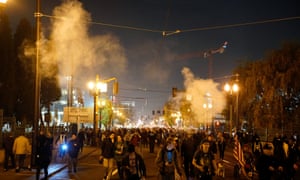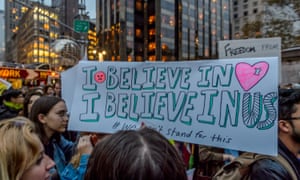

They said he wrote music to slit your wrists to, which in this week of all weeks feels timely. As it happens, I never felt that barb was fair to Leonard Cohen. True, his songs often told of gloom and defeat and darkness, but his voice was one of consolation – of sharing the loss by finding another who felt it too, of discovering the glimmer of love or light that might get you through.
My word, do we need that now. Cohen died on Monday, slipping out before he had to glimpse the news that has convulsed the world. He saw a lot in his 82 years, but he never had to see the words President-elect Trump. With his impeccable timing, Cohen spared himself that ordeal. But his songs anticipated how the rest of us would feel. Looked through the paper. Makes you wanna cry.
The Trumpists and their sycophants outside the US taunt those of us who are fearful. Boris Johnson says we need to get over our collective “whinge-orama”and embrace the new reality. Iain Duncan Smith says Barack Obama was a cold fish anyway, and he’s glad to see the back of him. Nigel Farage chooses to describe America’s first black president as a “creature”. Why, Trump’s arrival could even be a good thing, they say: he might offer the UK a decent post-Brexit trade deal.
This is not only pathetic in its cravenness, grovelling to a bigot when the moment demanded some of the moral steel shown by Angela Merkel – who extended her hand to Trump, but only on condition that he accept basic human values including respect for the minorities he had so copiously insulted – it is also unforgivably myopic. It fails to see there is a much larger picture here. It is not hysterical to suspect that the world we have known, the postwar order that provided relative peace and prosperity for seven decades – spanning the lifetime of Leonard Cohen’s generation – is unravelling. Or as France’s ambassador to the US put it, in a tweet later deleted: “This is the end of an epoch … The world is crumbling before our eyes.”What those who share his anxiety have in mind is the rules-based system that has allowed us to take international stability for granted, to regard it as the natural way of things, since 1945.
Central to that order has been free trade, broadly defined, along with a sturdy international architecture, designed to allow nations that once fought each other to resolve their differences diplomatically instead. It has consisted of an alphabet soup ranging from the UN and EU to the IMF and G20, and myriad others. And – not that it’s popular to say so – underpinning it all, down to patrolling the shipping lanes that make global trade possible, has been the leadership of the US.
For the last decade, foreign policy types have fretted that this set-up was under threat. Their worry was that a rising China, as it grew more assertive, would overtake the US – but that it would refuse to take on the obligations attached to being the world’s leading power. What few envisaged was that the threat to American leadership would come from the US itself, in the form of a president eager to shake off the duties shouldered by his country since 1945.
Yet that is what a Trump presidency augurs. He is opposed to free trade; a protectionist bent only on transactional deals in which America wins and the other side loses. Trump has no interest in spending US capital – diplomatic or financial – on upholding a global system that is, heaven knows, imperfect but at least aims to benefit everybody.

A paramount example: Trump’s team have signalled that one of his first acts in office will be to cancel the Paris accord on climate change. To reach that agreement with Beijing took years of effort by the Obama administration, and would soon have started reducing the carbon emissions that are choking our planet. It will take just a second, a stroke of the pen, for Trump to destroy it. He has threatened to do the same with the painstakingly brokered deal on Iranian nuclear weapons. Get ready for the future: it is murder.
But what I detect in those distressed by Trump’s election are more intimate concerns. How, so many have asked, do we explain this to our children? How do you raise a child to believe that lying is wrong, when a compulsive liar has been rewarded with the biggest prize on Earth? (The very first words Trump uttered in the Oval Office, during that Thursday encounter with Obama that was almost too painful to watch, were a lie. “This was a meeting that was going to last 10 or 15 minutes,” he said, boasting that the session had overrun. In fact, the meeting was scheduled to last an hour.)
We say that “cheats never prosper”, but Trump did not pay income tax for two decades – he cheated his fellow citizens, depriving them of the money needed to pay for the basic fabric of society – and he has prospered. What do you say to the child who says, “Mr Trump was right. Not paying taxes is smart.”
Parents of daughters were looking forward to pointing at President Hillary Clinton as proof that there was no goal beyond their reach. Now they can only look bitterly at that photo of New York Times journalists preparing the front page that was never published. Its planned headline: Madam President.
They will somehow have to explain, as my colleague Hadley Freeman has pointed out, how one of the most qualified people ever to run for president lost out to the least qualified. And they will have to tell their sons that no, it is never acceptable to grab women that way, even though Trump did it and bragged about it and was rewarded with the votes of tens of millions of Americans.
They will have to find a new way to explain why casual, racially charged insult is wrong, even though it has been practised and endorsed from on high. Already non-white Americans are reporting incidents of abuse they’d never experienced before, just as ethnic minority Britons did after the Brexit referendum. Witness the man told to “fuck off” simply because he was overheard talking to his daughter in Spanish.
We tell ourselves, in the stories we read and the movies we watch, that in the end good triumphs over evil. To see Obama, a man whose moral integrity is not doubted, be replaced by a liar and a bigot is to confound that hope. To see Trump set about dismantling the Obama legacy, as if erasing his presidency, is to see that good is sometimes crushed. Everybody knows that the war is over. Everybody knows the good guys lost.
Yet somehow we will have to get through this darkness. Cohen’s preferred method was to count on love – “the only engine of survival” – and to see that sometimes a setback, even a disaster, can lead to something better. It is such small consolation, but right now I cling to it. As the old poet said, There is a crack in everything. That’s how the light gets in.
[Source:-The Guardian]





